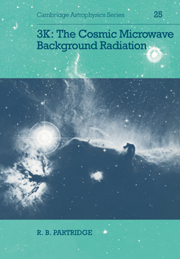Book contents
- Frontmatter
- Contents
- Preface
- 1 Cosmology
- 2 The early history of CBR studies
- 3 Radio astronomy
- 4 The spectrum of the CBR
- 5 What we learn from observations of the CBR spectrum
- 6 Searches for anisotropy in the CBR on large angular scales
- 7 Searches for anisotropy in the CBR on small angular scales
- 8 What do we learn from the angular distribution of the CBR?
- Appendix A A measurement of excess antenna temperature at 4080 Mc/s
- Appendix B Cosmic blackbody radiation
- Appendix C Recent results
- Index
1 - Cosmology
Published online by Cambridge University Press: 17 September 2009
- Frontmatter
- Contents
- Preface
- 1 Cosmology
- 2 The early history of CBR studies
- 3 Radio astronomy
- 4 The spectrum of the CBR
- 5 What we learn from observations of the CBR spectrum
- 6 Searches for anisotropy in the CBR on large angular scales
- 7 Searches for anisotropy in the CBR on small angular scales
- 8 What do we learn from the angular distribution of the CBR?
- Appendix A A measurement of excess antenna temperature at 4080 Mc/s
- Appendix B Cosmic blackbody radiation
- Appendix C Recent results
- Index
Summary
The science that treats the properties and evolution of the Universe as a whole is cosmology. Among the sciences, it is unique in having only a single object of study – there are no other Universes for us to use as controls, nor can we readily run the whole experiment over again. As a consequence, much of the effort in modern cosmology has been to determine the best mathematical description, or ‘model’, of the Universe we inhabit. As we shall see, that task is not yet complete, despite the rapid advances of the past few decades. The range of possible models is presented later in this chapter. First, though, we need to look at the observational bases of modern cosmology, a set of astronomical observations which have established the Hot Big Bang theory and restricted the range of models we need to consider.
Astronomical constituents of the Universe
Since cosmology is the study of the Universe as a whole and as a single system, it is only indirectly concerned with subsystems within the Universe. Here, I will mention only two: galaxies and clusters of galaxies. The galaxies are assemblies of 108–1012 stars; many galaxies also contain appreciable amounts of interstellar gas and dust.
- Type
- Chapter
- Information
- 3K: The Cosmic Microwave Background Radiation , pp. 1 - 41Publisher: Cambridge University PressPrint publication year: 1995



